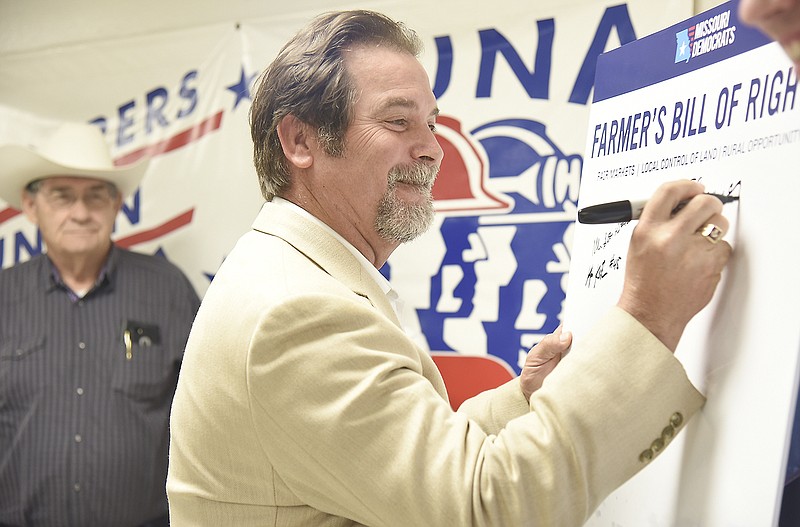Two Columbia area lawmakers were the first to sign their names supporting a proposed "Farmer's Bill of Rights," during the first of a series of Democratic Party news conferences scheduled to promote the idea.
"It is clear that rural Missouri is facing challenges - challenges from population loss to a rural poverty rate that is higher than the national average," former Rep. Stephen Webber, D-Columbia, told the Jefferson City news conference Monday afternoon, "to lack of job growth and depressed wages."
The proposal seeks support for three ideas, that Missouri's family farmers have a right to:
- Fair and open markets
- Local land control
- "Rural opportunity"
"The economic engine of rural Missouri is agriculture," Webber added. "It's family farms.
"And what we've been seeing in agriculture is a consolidation among multi-national ag conglomerates that are using their size and their monopoly power to bully and to intimate family farmers, manipulate markets and prices, and to extract wealth that's created in rural communities."
He said the effort in promoting the "Bill of Rights" is a "long-term plan, a long-term vision. We're not saying that things are going to turn around overnight.
"What we are saying is that these are the correct values to fight for."
Wes Shoemyer, D-Clarence - a third generation family farmer and former state representative and senator - works with the group "Missouri's Food For America."
"I will work with anyone who wants to further the policies that, I believe, will make a stronger Missouri and a stronger rural Missouri," he said. "I got involved in politics for one simple reason - that I believed we could have whatever kind of agriculture we wanted.
"All we have to do is develop policies that promote it."
He said "Big Ag's" 40-year control of Missouri's farm policies have resulted in fewer small businesses in Missouri's farming communities and a poorer economy.
"How many people in this room would have believed that your Missouri Legislature would vote to allow foreign corporations to own our farmland?" Shoemyer asked, noting that has happened in several areas.
Rep. Martha Stevens, D-Columbia, was the first to sign the poster.
She said the "local control" right is needed to protect local farms and farm families from health hazards associated with large, corporate farms - especially concentrated animal feeding operations, known as CAFOs.
"Over the past 15 years, corporate agri-business interests have been pushing state legislators here in Missouri to take away the ability of local governments to enact health ordinances and impose stricter controls on factory farms seeking to move into their communities," Stevens said. "Local communities should have the right to protect themselves from the negative health and environmental impacts that CAFOs have on family farms."
Stevens said data shows CAFOs create well-documented health risks, including hogs producing "four times the waste of the average person," which results in 2.8 million hogs possibly generating "as much untreated waste as 11.2 million people - nearly double the population of the whole state of Missouri."
At the same time, she noted, Missouri has approximately 500 CAFOs, while Iowa - with a smaller land mass and population - has more than 5,000 animal feeding operations.
An Iowa company has proposed a CAFO for Callaway County, near Hatton, that residents are challenging in the state regulatory process and in the courts.
"Iowa studies reveal that children living next to CAFOs have higher rates of asthma than other farm children," Stevens said, saying the difference is 19.7 percent of children attending schools near CAFOs having asthma, compared with 7.3 percent of incidence for children whose school is at least 10 miles away from a CAFO.
Stevens also noted the vast majority of Missouri's livestock farms, more than 99 percent, "are independent family farmers. Those are the people we should be fighting for."
State Rep. Kip Kendrick, D-Columbia - the second person to sign the poster - noted he was raised in Monroe and Marion counties.
"I've seen first-hand what happens when big corporations extract wealth from the community by controlling ag and undermining family farms," he said. "As big corporations sucked more money from the communities and sent it to the coasts - and overseas - it meant fewer opportunities existed in my community and communities like mine."
Cattle farmer J.C. Owsley, of Cross Timbers, produces livestock in Benton and Hickory counties.
"I live in a part of the state where farmers are going out of business," he said, noting "the concentration of agricultural production and the loss of marker competition has been absolutely disastrous for rural communities."

